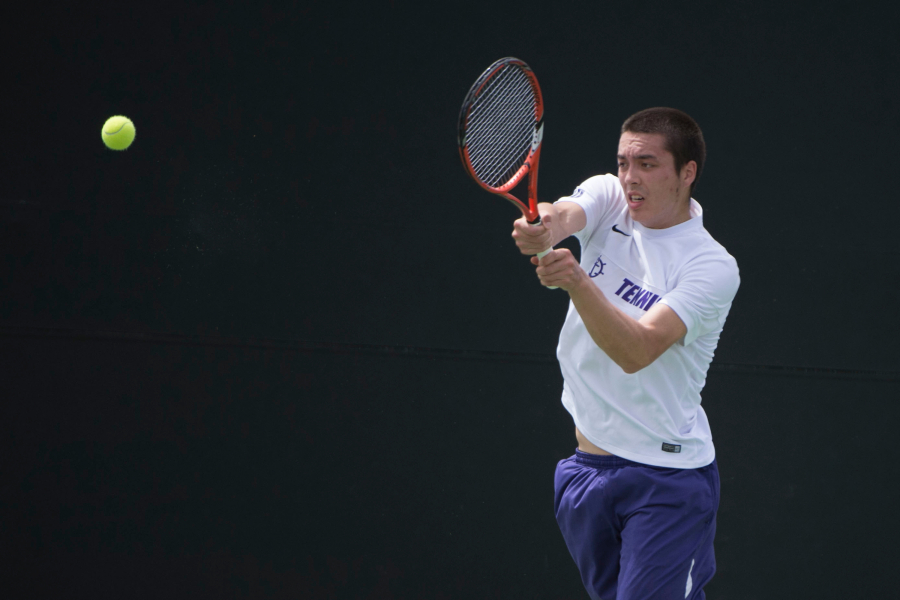PORTLAND — With every one of his 130 mph serves, what Alex Wallace’s college tennis coach labels as one of the most powerful in all of NCAA Division I men’s tennis, it’s like his long-standing identity never vanished.
Every point won, emotion follows. Every match, victor or not, tears can shed for different reasons.
Wallace, a Vancouver native and redshirt junior on the University of Portland’s men’s tennis team, doesn’t want you to think like those around him. That depression and personality disorders are signs of weakness. That no one will help you. That’s you’re on your own.
The 2013 Union High School graduate describes the impact a recent year-long stretch made in his own battles with mental health: quitting tennis for the second time in three years, being labeled crazy for pursuing Division I baseball, and worse, discovering the dead body of his friend and ex-tennis teammate in their North Portland off-campus house.
But above else, the actions in this timeline helped Wallace have a life-altering breakthrough. His relationship with tennis is healthy again, and more importantly, he wants to help others in a similar state.
But first, he needed to help himself.
“No matter how bad things are,” the 22-year-old Wallace said, “you can always find a way out. There’s always a way out.”
His college tennis coach thought he coached Wallace for the final time two years ago after Wallace departed the program in a hazy mental state. Yet on the cusp of the West Coast Conference championships, which started Thursday in Claremont, Calif., in what’s been a historic season for the Pilots, Wallace’s relationship with tennis is better than ever. And it took the unlikeliest events to repair it.
Dark clouds linger
Most days, Wallace sees tennis for what it is: a sport he grew to love, a sport he got good at quickly, and a sport that became his identity as a pre-teen.
For a time, though, dark clouds lingered.
Labeled as one of the nicest teens in the Pacific Northwest junior tennis circuit, it came with a price: emptiness and a lost of interest. Outside pressures and high expectations got the best of him. A top-10 national age-group ranking didn’t matter when you’re playing for everybody but yourself.
“I let tennis affect my life,” Wallace said.
In high school, he was a winner. Wallace reached the WIAA state tournament three times, including consecutive appearances in the 3A singles final. But high school was the worst four years of his life, he said. He quit tennis at Union before the 2011 bi-district tournament only to return as a senior.
His relationship with his parents, Michael and Miriam, became strained. Then came anti-depressants, anti-psychotics and a chronic depressive disorder diagnosis. He’s also been hospitalized for insomnia, and now openly talks about the suicidal plans he once devised.
Aaron Gross, UP’s longtime men’s tennis coach, knows all about Wallace’s mental struggles with tennis, well before he chose to play for Gross at the private Catholic school. The two met 11 years ago when Wallace joined The Academy, Gross’ all-inclusive youth tennis training club.
Gross said excess pressures and lofty expectations are common challenges for junior tennis players. The higher the ranking, the bigger the load, and Wallace was no exception.
“That’s the toughest thing for kids to manage,” Gross said. “There’s pressures when you get to a certain level.”
Even when Wallace left the team after the 2014 season, unable to escape tennis’ negative side, the two agreed Wallace staying involved on the side was the right choice. He loved his teammates, he loved the coaching. He assisted with Gross’ Academy players and attended UP home matches.
That is, until a video game brought permanent change.
The midnight pitch
It’s after midnight, and the lights on the intramural sports field were still lit.
It’s September 2014, and months earlier, Wallace was a mess mentality. At 220 pounds — almost 50 pounds higher than his high school weight — he played his freshman season at UP out of shape, and got by using his powerful serve to go 4-7 in singles and 2-2 with doubles partner Ratan Gill. By now, he left the Pilots’ roster.
In addition to depression and manic episodes, Wallace struggles with insomnia. These days, four hours of sleep a night is a good night.
On this night, wide awake playing a PlayStation baseball game, Wallace found a baseball, ventured to the lit field, and simulated pitching into a soccer goal net for 45 minutes.
Baseball — an organized sport Wallace never even played as a little leaguer, and a sport he even made fun of — was his unlikely ticket out of the clouds, he thought.
Why? Seeking the self-confidence and self-worth he craved.
“For the longest time, I felt like I wasn’t good at anything except for tennis,” Wallace said. “… I jumped, having no idea if my parachute would come out, or if I’d fall flat on the ground. I took a leap of faith that the parachute would come out.”
It did.
He hired a private pitching coach for $40 an hour, and the left-hander’s hard serving velocity translated well. Within nine months of a baseball-focused track, his fastball hit the mid-80s. He even landed the closer’s role for the Stumptown Mavericks, a Portland-based low-level collegiate woodbat summer team.
Goal No. 1? Make the Pilots’ baseball roster. Goal No. 2? Make the Major Leagues.
Crazy? Wallace heard it all.
Crazier for even pitching in a Mavericks game 24 hours after the most traumatizing event of your life? Don’t call him crazy.
A heartbreaking discovery
The house was cool, because the air conditioning unexpectedly was cranked up.
That’s how Wallace knew something was awry one mid-August day in 2015, now fully invested in baseball for almost a year, returning to what he assumed was an empty house. His best friend, roommate and ex-UP tennis teammate Reid deLaubenfels was nowhere to be found, and never left without turning off the A/C unit. Yet his car was parked outside their off-campus house.
The two were UP teammates for one season, but their friendship dated back years. DeLaubenfels even beat Wallace for the Class 3A singles title in 2010 — deLaubenfels’ senior year at Seattle’s Nathan Hale High.
They’re all part of a flood of good memories. Wallace found deLaubenfels dead from what the Multnomah County medical examiner’s office determined was an accidental head injury.
“I made the decision to walk into his room, and turn on the light,” Wallace said. “I can’t tell you how that feels; I knew he was gone.”
Speculation, according to Wallace, was deLaubenfels’ skull-fracture injury occurred the previous day at home. He was set to graduate in fall 2015.
A traumatizing event turned insightful for Wallace, who still grieves daily. Not only did support from the tennis and campus communities show Wallace a different side of people he needed to see, it also showed he can compete for another reason: keeping deLaubenfels’ legacy alive through competitiveness and vigor.
“No one did it better than he did,” Wallace said.
But it took another four weeks — and shagging baseballs on Joe Etzel Field — for him to ask, “What am I doing?”
Soul not into baseball
Geoff Loomis’ initial thoughts: potential.
Wallace’s 6-foot-2 lefty frame caught Loomis’ attention during a fall 2015 open tryout for UP’s baseball team. Loomis, months into his first Division I job after coaching 13 seasons at NCAA Division III Pacific Lutheran, knew Wallace’s story. What impressed UP’s head baseball coach even more was the desire and determination.
“He had an incredible want to try to pitch, and to try baseball as his sport,” said Loomis, now in his second season with the Pilots.
That same tryout featured now-starter Kevin Baker, who leads UP in wins (three) and ERA (3.54) this season, among other categories. Loomis couldn’t say what role Wallace would have played if he stuck with it, but the coaching staff thought enough of Wallace to give him a shot.
“We were interested to see if he would grow over the fall,” Loomis said, “and see where it took him.”
Wallace turned in his gear after one day.
A year’s worth of sacrifice, dreams and dedication was over. That similar emptiness in tennis crept into baseball, but so was an unforeseen level of selfishness. Leaving baseball was OK — “I felt like my soul wasn’t there,” he said — because he fulfilled his goal. That, in part, is why he describes his baseball journey like this: discovering who is he, and being comfortable with what he offers.
That belonged in tennis.
“(Baseball) allowed me to completely remove all the skeletons out of my closet,” Wallace said. “I was doing everything for myself; I realized I needed balance in my life. I felt like I almost completely detached myself and from that (baseball) community just because I needed to find myself.”
A tennis return
Gross, in his 20th season as UP’s coach, estimated Wallace played more tennis than anybody in the country preparing for what became his best college season in 2016.
Wallace dropped the weight that slowed him freshman year. He reshaped his body, reshaped his career, and in turn, his relationship with his parents rekindled. Last spring, he went 14-5 in singles, and hasn’t lost a home match in two seasons.
“He was so eager and hungry,” Gross recalled. Within two months, Wallace gained his teammates’ respect, and after that, everything fell into place, he said. “He was really able to help form our team.”
Flash forward to last weekend, when the Pilots captured the WCC title for the first time in program history by topping Pepperdine, then capped a 18-2 regular season by defeating Loyola Marymount. Wallace did his part by sweeping both his singles matches. UP enters the WCC Championships as the No. 1 overall seed, and despite a nagging back injury this season, Wallace is 8-4 at No. 4 singles, a winner of three straight matches.
While Wallace is healthier, he knows he’ll never be cured. Bouts of self-doubt and expectations that once slowed him do turn up, and he’s better positioned to deal with it. His focus now is helping others make right decisions by first taking the right steps, and to change the perception regarding mental-health disorders and illnesses.
The message isn’t about fear, he said; it starts with a conversation and attaching a face.
Wallace hopes that face is his.
“If I can do that,” he said, “I can live the rest of my life a happy man.
“Had I not gone into baseball, I would have never figured it out. I would still be that jarred, angry, delinquent person that I thought I’d be forever.”




